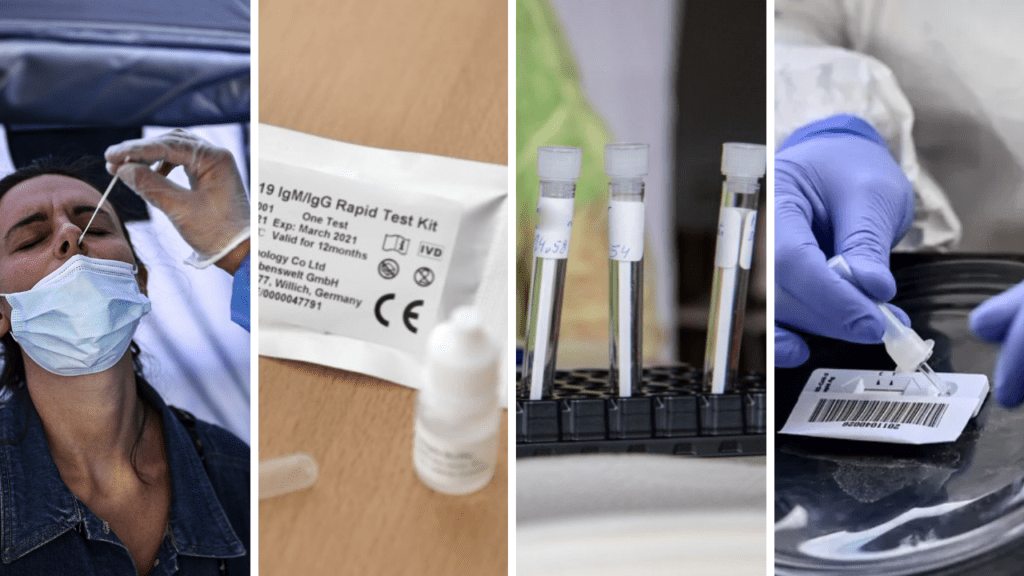As a number of new kinds of tests to detect a Covid-19 infection are becoming available, Belgium is updating its testing strategy to incorporate them.
While PCR tests (nose swabs) are still a very important part of Belgium's Covid-19 testing strategy, new techniques such as rapid tests will be added, according to Corona Commissioner Pedro Facon.
"PCR tests remain the gold standard in testing policy because they have the greatest reliability," he said during a press conference on Wednesday. "However, as scientific developments provide us with new techniques, we can now start working with them."
Particularly for patients with symptoms of Covid-19 infections, rapid antigen tests are almost as reliable as PCR tests, provided that they are carried out within the first five days after the onset of the symptoms.
"Those rapid antigen tests are very reliable in people with symptoms, so they will be used in hospitals, but also in test centres and GP practices," added Herman Goossens, chair of the Testing Task Force.
Related News
- Coronalert now allows users to link their coronavirus test results directly to app
- Belgium adapts quarantine rules as asymptomatic tests resume
- Belgians travelling to Spain need to show proof of a negative coronavirus test
Additionally, they will also be used for research into clusters, such as in schools, sports clubs and companies.
"It is, of course, also important that the tests are carried out by trained personnel in a suitable environment that guarantees safety for all concerned," Facon said.
When the rapid test shows a negative result, but there is a strong suspicion of infection, or in case of vulnerable persons, a PCR test will still be taken to be sure, according to him.
For people without symptoms - both pre-symptomatic and asymptomatic patients - several limited studies show that rapid antigen tests are significantly less reliable than the PCR test.
Rapid tests for events?
"However, the rapid tests may still have a place in the framework of low-risk collectivities, such as companies," Facon said, adding that this is not the case for residential care centres.
Outside the framework of public health, such as for events or crowds at sports games, rapid tests cannot be banned, according to Goossens, but they are not without risks.
"Based on what we now know, we cannot use rapid antigen tests as convincing evidence of the absence of infection in the general population," he stressed. "The most we can say is that a negative test means that someone is not infectious on that day. Only on that day, because it can be different the day after."
"To put it simply and without any nuance: the PCR test tells us that we are infected, and the rapid antigen test tells us that we are infectious," Goossens said. "It is very important to realise that that is not the same thing."
Additionally, as a negative rapid test on an asymptomatic person does not prove that there is no infection, it can never be a reason to ignore the basic rules, to refuse quarantine or to stop prematurely, he added.
Several other issues also make the use of rapid tests for events impossible for the time being, but the reporting of the results is the most important one.
"Someone who tests positive with a rapid antigen test is highly infectious, and needs to be followed up by contact tracing quickly, to prevent further spread," Goossens said.
The task force is currently working on a legal framework for the use of the tests outside of a public health context, according to him.
Other testing methods
In addition to the rapid antigen tests, saliva tests are also becoming available now. "They will be promising for repeat tests, as the saliva can be collected by the individuals themselves," Facon said, adding that no health care staff or protective equipment is needed for these tests.
Self-tests, he stressed, are not yet permitted by law in Belgium at the moment. "However, we are investigating in what way self-testing can also be included in the testing strategy, in the long term, but that is not the case at the moment."
Lastly, a number of other test methods, such as the use of sniffer dogs and respiratory tests, are currently also being investigated with some scientific studies and pilot projects, according to Facon.
Maïthé Chini
The Brussels Times

